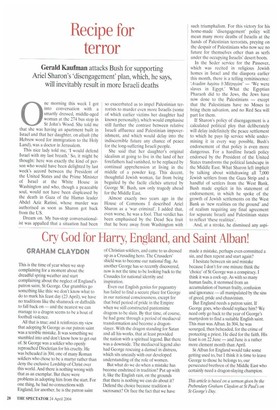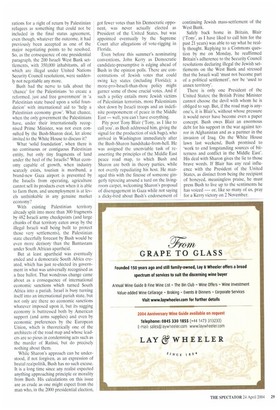Cry God for Harry, England, and Saint Alban!
GRAHAM CLAYDON
This is the time of year when we stop complaining for a moment about the dreadful spring weather and start complaining about the neglect of England's patron saint, St George. Our grumbles go something like this: we don't know what to do to mark his feast day (23 April), we have no traditions like the shamrock or daffodils to fall back on — and the nearest we can manage to a dragon seems to be a bout of football violence.
All that is true; and it reinforces my view that adopting St George as our patron saint was a terrible mistake. It was something we stumbled into and don't know how to get out of. St George was a soldier who openly reproached Diocletian for his cruelty. He was beheaded in 304, one of many Roman soldiers who chose to be a martyr rather than deny the exclusive Lordship of Christ over this world. And there is nothing wrong with that as an exemplar. But there were problems in adopting him from the start. For one thing, he had no connections with England; for another, he is the patron saint of Christian soldiers, and came to us dressed up as a Crusading hero. The Crusaders' shield was to become our national flag. As another George has so recently discovered, now is not the time to be looking back to the Crusades for national identity and inspiration.
Even our English genius for pageantry has failed to find a secure place for George in our national consciousness, except for that brief period of pride in the Empire when we still constructed pantomime dragons to be slain. By that time, of course, he had gone through a period of mediaeval transformation and become a dragonslayer. With the dragon standing for Satan and all his works, that at least provided the nation with a spiritual legend. But there was a downside. The mediaeval legend also had George rescuing a damsel in distress, which sits uneasily with our developed understanding of the role of women.
But what do we do when a mistake has become enshrined in tradition? Put up with it, like the English rain, on the grounds that there is nothing we can do about it? Defend the choice because tradition is sacrosanct? Or face the fact that we have made a mistake, perhaps even committed a sin, and then repent and start again?
I hesitate between sin and mistake because I don't for one minute think the 'choice' of St George was a conspiracy. I think it was a cock-up. As with so many human faults, it stemmed from an accumulation of human frailty, confusion and ignorance — all manipulated by the sins of greed, pride and chauvinism.
But England needs a patron saint. If George goes, who should replace him? We need only go back to the year of George's martyrdom to find a suitable English saint. This man was Alban. In 304, he was scourged, then beheaded, for the crime of protecting a priest. He died for the faith. His feast is on 22 June — and June is a rather more clement month than April.
St Alban for England would take some getting used to, but I think it is time to leave George to those he belongs to, our persecuted brethren of the Middle East who certainly need a dragon-slaying champion.
This article is based on a sermon given by the Prebendary Graham Claydon at St Paul's on Sr George's Day. rations for a right of return by Palestinian refugees as something that could not be included in the final status agreement, even though, whatever the outcome, it had previously been accepted as one of the major negotiating points to be resolved. So, as the consequence of one presidential paragraph, the 200 Israeli West Bank settlements, with 350,000 inhabitants, all of which are illegal under United Nations Security Council resolutions, were suddenly not negotiable any more.
Bush had the nerve to talk about the 'chance' for the Palestinians `to create a reformed, just and free government' in 'a Palestinian state based upon a solid foundation' with international aid to 'help a Palestinian economy grow'. What chance, when the only government the Palestinians have, under their internationally recognised Prime Minister, was not even consulted by the Bush-Sharon deal, let alone invited to the White House to discuss it?
What 'solid foundation', when there is no continuous or contiguous Palestinian entity, but only tiny fragments of land under the heel of the Israelis? What economy capable of growth, when industry scarcely exists, tourism is moribund, a brand-new Gaza airport is prevented by the Israelis from operating, agriculture cannot sell its products even when it is able to farm them, and unemployment is at levels unthinkable in any genuine market economy?
With existing Palestinian territory already split into more than 300 fragments by 482 Israeli army checkpoints (and large chunks of that territory eaten away by the illegal Israeli wall being built to protect those very settlements), the Palestinian state cheerfully forecast by Bush would be even more derisory than the Bantustans under South African apartheid.
But at least apartheid was eventually ended and a democratic South Africa created, which has just re-elected its government in what was universally recognised as a free ballot. That wondrous change came about as a consequence of international economic sanctions which turned South Africa into a pariah. Israel is busy turning itself into an international pariah state, but not only are there no economic sanctions whatever imposed upon it, but its sagging economy is buttressed both by American support (and arms supplies) and even by economic preferences by the European Union, which is theoretically one of the architects of the road map and whose leaders are so pious in condemning acts such as the murder of Ratissi, but do precisely nothing about them.
While Sharon's approach can be understood, if not forgiven, as an expression of brutal realpolitik, Bush has no such excuse. It is a long time since any realist expected anything approaching principle or morality from Bush. His calculations on this issue are as crude as one might expect from the man who, in the 2000 presidential election, got fewer votes than his Democratic opponent, was never actually elected as President of the United States, but was appointed eventually by the Supreme Court after allegations of vote-rigging in Florida.
Even before this summer's nominating conventions, John Kerry as Democratic candidate-presumptive is edging ahead of Bush in the opinion polls. There are concentrations of Jewish votes that could swing key states (including Florida); a more-pro-Israeli-than-thou policy might garner some of those crucial votes. And if such a policy entails more Jewish victims of Palestinian terrorists, more Palestinians shot down by Israeli troops and an indefinite postponement of peace in the Middle East — well, you can't have everything.
Pity poor Tony Blair ('Tony, as I like to call you', as Bush addressed him, giving the signal for the production of sick bags), who arrived in Washington immediately after the Bush-Sharon handshake-from-hell. He was assigned the unenviable task of reasserting the principles of the Middle East peace road map, to which Bush and Sharon are both in theory parties, while not overtly repudiating his host. He managed this with the finesse of someone gingerly tiptoeing around a turd on the livingroom carpet, welcoming Sharon's proposal of disengagement in Gaza while not saying a dicky-bird about Bush's endorsement of continuing Jewish mass-settlement of the West Bank.
Safely back home in Britain, Blair (`Tony', as I have liked to call him for the past 21 years) was able to say what he really thought. Replying to a Commons question by me on Monday, he reaffirmed Britain's adherence to the Security Council resolutions declaring illegal the Jewish settlements on the West Bank and stressed that the Israeli wall 'must not become part of a political settlement', nor be 'used to annex territory'.
There is only one President of the United States; the British Prime Minister cannot choose the devil with whom he is obliged to sup. But, if the road map is anyone's, it is Blair's, without whose pressure it would never have become even a paper concept. Bush owes Blair an enormous debt for his support in the war against terror in Afghanistan and as a partner in the invasion of Iraq. On the White House lawn last weekend, Bush promised to 'work to end longstanding sources of bitterness and conflict in the Middle East'. His deal with Sharon gives the lie to those brave words. If Blair has any real influence with the President of the United States, as distinct from being the recipient of honeyed, meaningless praise, he must press Bush to live up to the sentiments he has voiced — or, like so many of us, pray for a Kerry victory on 2 November.



















































































 Previous page
Previous page